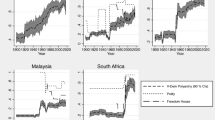Abstract
This article uses the ‘Ticking Bomb Scenario’ as a starting point for a broader discussion of what I term the ‘liberal narrative of speed’, the argument within liberal thought (laid out by William Scheuerman) that the accelerating pace of events (and threats) in the world requires a transition of authority from slow-moving, democratic legislative bodies, to energetic, efficient and unitary executives. However, this article argues that the source of this transfer of power is not because of any structural misfit between democracy and acceleration (indeed, accelerative technologies can help make democratic deliberation more efficient and effective). Instead, through an investigation of the ontology of speed (grounded in the work of Gilles Deleuze and Felix Guattari and Henri Bergson) I argue that speed produces not a functional threat to democratic politics, but an existential one. Acceleration unsettles stable political identities, and produces a time of uncertainty, in which people are wary of engaging in democratic debate and compromise, preferring instead the certainty of unitary executive leadership. In this regards the anti-democratic tendency of acceleration is to be located in the way in which it inculcates a sense of ressentiment against a future that is contingent and uncertainty.
Similar content being viewed by others
Notes
For an additional critique of this image of the ‘rapid-fire’ executive see also Scheuerman (2002).
Although it is important to note that Scheuerman too identifies the liberal narrative of speed as the carrying-over of pre-liberal ‘reason-of-state’ doctrines into liberal thought (Scheuerman, 2002, p. 494).
In this regard, my critique is perhaps slightly more optimistic than Scheuerman's, whose exogenous critique still fundamentally accepts the logic of the liberal narrative of speed, and therefore simply pushes off an anti-democratic movement which is, seemingly, inevitable.
Here we might look to the work of older liberals, such as John Dewey, as well as contemporary liberal thinkers such as Robert Dahl, Robert Putnam, Richard E. Flathman and James Tully.
References
Bergson, H. (1974) The Creative Mind. Translated by M.L. Andison. New York: Citadel Press.
Bergson, H. (1998) Creative Evolution. Translated by A. Mitchell. Toronto: Dover Press.
Bufacchi, V. and Arrigo, J.M. (2006) Torture, terrorism and the state: A refutation of the ticking-bomb argument. Journal of Applied Philosophy 23 (3): 255–264.
Connolly, W.E. (2002) Neuropolitics: Thinking, Culture, Speed. Minneapolis, MN: University of Minnesota Press.
Deleuze, G. (1990) The Logic of Sense. Translated by M. Lester. New York: Columbia University Press.
Deleuze, G. and Guattari, F. (1987) A Thousand Plateaus. Translated by B. Massumi. Minneapolis, MN: University of Minnesota Press.
Dershowitz, A.M. (2004) Warming up to torture. Los Angeles Times, 17 October.
Dershowitz, A.M. (2006) Should we fight terror with torture. The Independent, 3 July 2006.
Fukuyama, F. (1992) The End of History and the Last Man. New York: Perennial.
Lobel, J. (1989) Emergency power and the decline of liberalism. The Yale Law Journal 98 (7): 1385–1433.
Lucretius, T. (1995) On the Nature of Things. Translated by A.M. Esolen. Baltimore, MD: Johns Hopkins University.
Mill, J.S. (1998) On Liberty and Other Essays. Oxford: Oxford University Press.
Rosa, H. (2003) Social acceleration: Ethical and political consequences of a desynchronized high-speed society. Constellations 10: 3–33.
Scheuerman, W.E. (2002) Rethinking crisis democracy. Constellations 9 (4): 492–505.
Scheuerman, W.E. (2004) Liberal Democracy and the Social Acceleration of Time. Baltimore, MD: Johns Hopkins University Press.
Yoo, J. (2005) The Powers of War and Peace. Chicago, IL: University of Chicago Press.
Acknowledgements
Thanks to William Connolly, Jane Bennett, Smita Rahman, Jairus Grove and the anonymous reviewers for their comments on this article.
Author information
Authors and Affiliations
Rights and permissions
About this article
Cite this article
Glezos, S. The ticking bomb: Speed, liberalism and ressentiment against the future. Contemp Polit Theory 10, 147–165 (2011). https://doi.org/10.1057/cpt.2010.6
Published:
Issue Date:
DOI: https://doi.org/10.1057/cpt.2010.6




